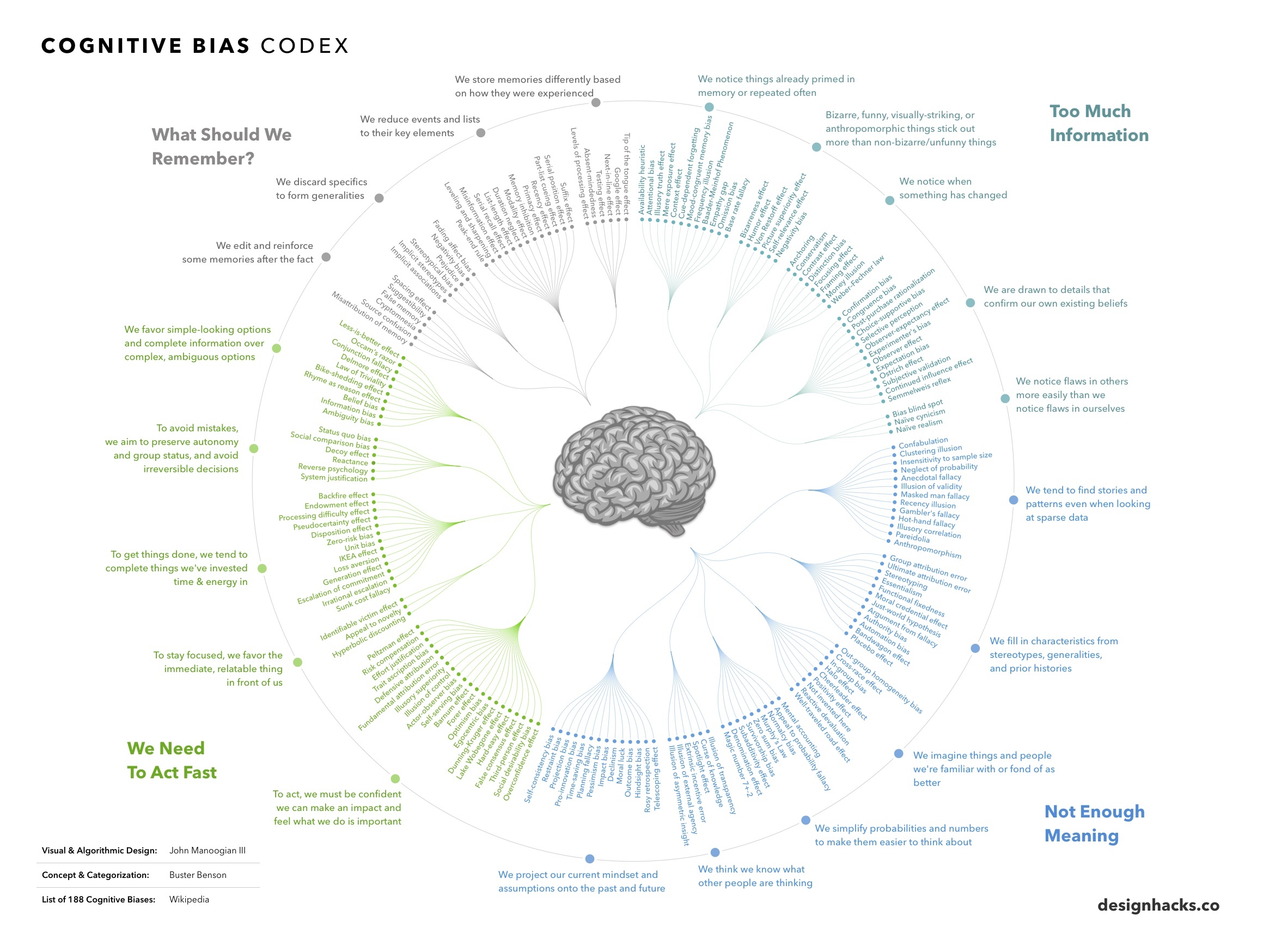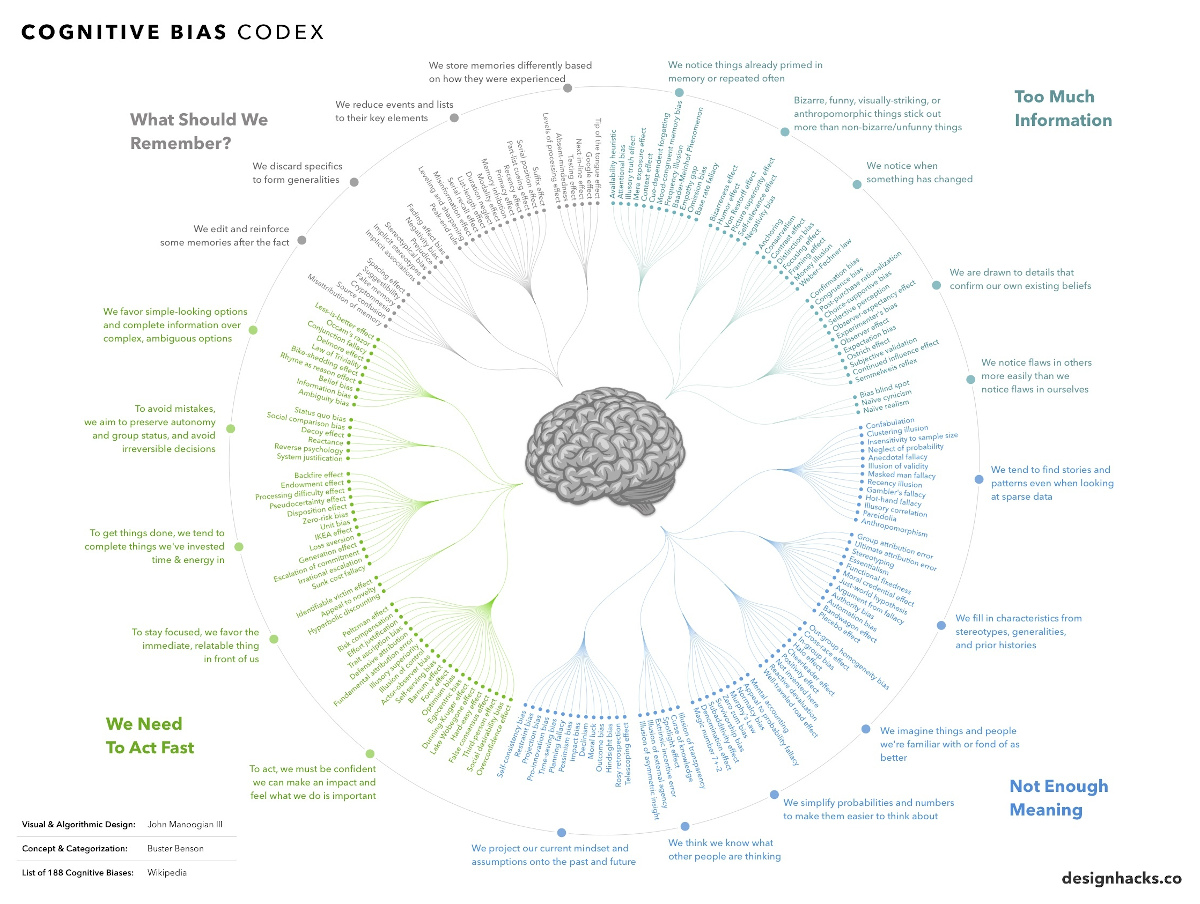[Resource] Cognitive Bias Infographic

Every Single Cognitive Bias in One Infographic
Published 3 years ago on August 26, 2021
Visit resource page
Every Single Cognitive Bias in One Infographic
View the high resolution version of today’s graphic by clicking here.
The human brain is capable of incredible things, but it’s also extremely flawed at times.
Science has shown that we tend to make all sorts of mental mistakes, called “cognitive biases”, that can affect both our thinking and actions. These biases can lead to us extrapolating information from the wrong sources, seeking to confirm existing beliefs, or failing to remember events the way they actually happened!
To be sure, this is all part of being human—but such cognitive biases can also have a profound effect on our endeavors, investments, and life in general.
For this reason, today’s infographic from DesignHacks.co is particularly handy. It shows and groups each of the 188 known confirmation biases in existence.
What is a Cognitive Bias?
Humans have a tendency to think in particular ways that can lead to systematic deviations from making rational judgments.
These tendencies usually arise from:
- Information processing shortcuts
- The limited processing ability of the brain
- Emotional and moral motivations
- Distortions in storing and retrieving memories
- Social influence
Cognitive biases have been studied for decades by academics in the fields of cognitive science, social psychology, and behavioral economics, but they are especially relevant in today’s information-packed world. They influence the way we think and act, and such irrational mental shortcuts can lead to all kinds of problems in entrepreneurship, investing, or management.
Cognitive Bias Examples
Here are five examples of how these types of biases can affect people in the business world:
1. Familiarity Bias: An investor puts her money in “what she knows”, rather than seeking the obvious benefits from portfolio diversification. Just because a certain type of industry or security is familiar doesn’t make it the logical selection.
2. Self-Attribution Bias: An entrepreneur overly attributes his company’s success to himself, rather than other factors (team, luck, industry trends). When things go bad, he blames these external factors for derailing his progress.
3. Anchoring Bias: An employee in a salary negotiation is too dependent on the first number mentioned in the negotiations, rather than rationally examining a range of options.
4. Survivorship Bias: Entrepreneurship looks easy, because there are so many successful entrepreneurs out there. However, this is a cognitive bias: the successful entrepreneurs are the ones still around, while the millions who failed went and did other things.
5. Gambler’s Fallacy: A venture capitalist sees a portfolio company rise and rise in value after its IPO, far behind what he initially thought possible. Instead of holding on to a winner and rationally evaluating the possibility that appreciation could still continue, he dumps the stock to lock in the existing gains.
-
By
DesignHacks.co
-
Published
Oct 02, 2024
-
Subject Area
- Age-friendly Communities
- Ageism
- Indigenous Peoples & Indigenous Relations
- Immigrants, Refugees, & Multicultural Seniors
- LGBTQIA2S+
- Non-profit / Charitable Sector Development
- Organizational Development
- Seniors’ Planning & Action Tables/Committees
-
Audience
- Academics
- Funders
- Government (Politicians, Policy Makers) and Health Authorities
- Service Providers (Non-profits, Community Organizations, Local government)
- Caregivers, Seniors & Volunteers
- Government
- Health Authorities
-
Category
- Advocacy
- Best Practices
- Organizational development
- Toolkits
- Other Resources/Services

